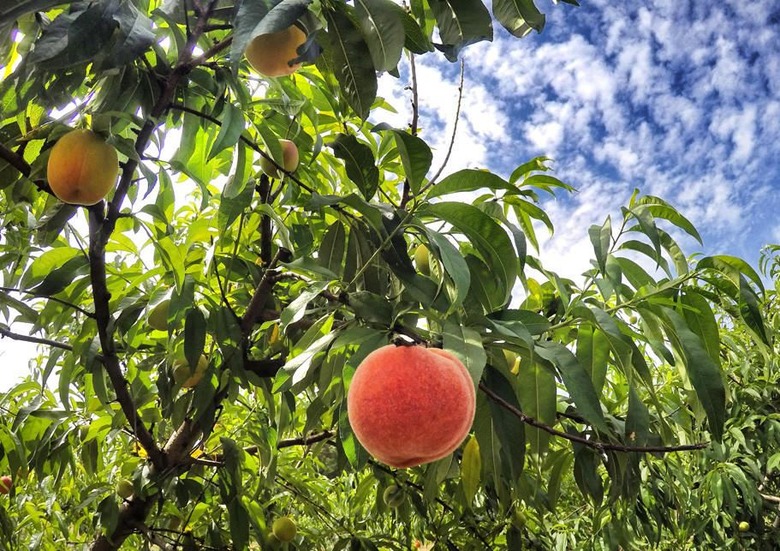Florida Peaches May Have Their Moment In The Sun
Surrounded by bushy trees, Ken and Alise Edison of Deer Park Peaches studied their incoming peach crop in various stages of growth from green buds to dusky orange fruit the size of a child's fist.
After freezes destroyed much of their citrus crop, the couple decided to take a chance on peaches about five years ago. It has been a challenge.
They overplanted at first with eight acres of peaches, unaware of the labor involved in growing and harvesting the crop. Warm winters have since led to small yields at the farm near St. Cloud, about an hour southeast of Orlando.
"I need a bumper sticker that says 'Farming ... It's not for sissies,'" Alise Edison said.
With the Georgia and South Carolina peach crops hurt by a recent freeze, Florida's smaller, sweeter peaches may have their moment in the sun — six decades after researchers first began exploring bringing the crop to Florida.
There are now between 1,400-2,000 acres in the Sunshine State dedicated to peaches, a jump from 200 in 2004, said Dr. Jose Chaparro, an associate professor of Fruit Tree Breeding and Genetics at the University of Florida.
Now a $148,955 grant from the marketing service of the U.S. Department of Agriculture will help the Florida Fruit and Vegetable Association and its partners increase awareness of Florida-grown peaches, their growing season and the fruit's sweet taste.
The money will go toward in-store sampling and digital and print advertising, according to Sonia Tighe, director of membership for the Florida Fruit and Vegetable Association, who spoke during a recent webinar.
A survey by the University of Florida Institute of Food and Agricultural Sciences found that consumers nationwide were unaware that Florida peaches are in season March through May. That's critical because shoppers are more likely to buy when the fruit is at its peak and from the United States, said Tori Bradley, a University of Florida graduate student studying food and resource economics.
"There's a lot of room to grow in increasing our consumer knowledge of Florida peach season," Bradley said.
UF scientists have been working since the early 1950s on breeding peach varieties suitable for Florida's climate and soil.
The fall of the tung tree, a major cash crop for Southeast United States, made finding options for Florida farmers crucial, Chaparro said. The plant was used to make oil for lubricating naval ships, but was rendered obsolete after the creation of synthetic oil.
Expanding crop alternatives has become even more vital as Florida citrus takes hits from weather and disease.
"The idea is to diversify in agriculture," Chaparro said. "The more diversified the industry, the better."
Scientists honed in on lowering the peach tree's "chill hours," or the number of hours trees need to be in temperatures below 45 degrees. Too few hours and the tree will flower late and poorly; too many and the fruit dies. Varieties developed by UF researchers need 100-150; a typical peach tree in Georgia requires between 700-900.
If the Florida-friendly peach varieties had been established 25 to 30 years ago, they would have done well, Chaparro said. Climate change now makes it impossible to identify whether the weather from one winter to the next is the "new normal." The past two winters have been unseasonably warm, he said.
The state's warmer weather has its positives. Florida peaches reach the market just after South American varieties and just before those from Georgia, South Carolina, California and Texas.
Peach trees are quick to grow into a harvesting crop but require a lot of work to maintain: pruning twice a year, thinning at least once a year and hand labor to harvest.
"Like any pioneering effort, there are a lot of mistakes made," Chaparro said.
The infrastructure set up for citrus in Florida isn't there for peaches, said Deer Park's Edison. Peach growers need to pick, pack and sell the crop themselves.
There are times when consumer demand can't keep up with the fast-growing peaches — at one point Ken Edison had about 10,000 pounds of fruit.
The yield from his farm is a bit too big for the local market, but too small for major distributors.
"We can grow it, it's just a question of getting rid of it," he said.
Want to go? Keep an eye on Deer Park Peaches' Facebook page for dates the orchard will be open to the public.
